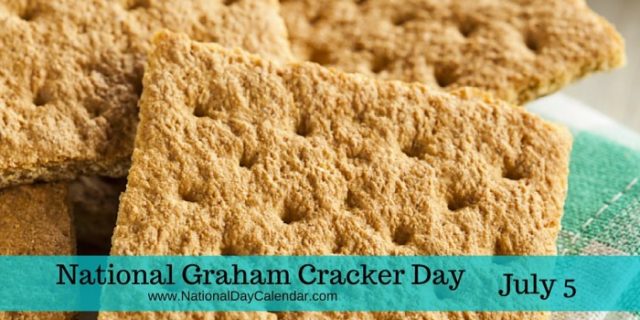
National Graham Cracker Day is observed annually on July 5th. The graham cracker was originally invented as a “health food” as part of the “Graham Diet”. Developed by Presbyterian minister, Sylvester Graham in the early 1800s, graham crackers were originally made from whole-wheat graham flour with added bran and wheat germs. The minister believed this snack would curb a variety of sinful cravings.
Modern graham crackers are made with bleached white flour and come in a variety of flavors including honey, cinnamon and chocolate. While a delicious snack on their own, they are also terrific ingredients for desserts. Crushed graham crackers blended with butter and pressed into pie tins or springform pans make excellent crusts when lightly toasted. One of the most popular treats made with graham crackers is the S’more.
Graham was, in fact, a real person: You may have noticed the name Graham is always capitalized when referring to the cracker. That’s because, unlike other snack foods, this one is actually named after a real person: the evangelical minister who created the recipe in 1829. His name was Sylvester Graham, and he was well before his time when it came to diets and healthy eating. For one, he was a vegetarian, a strange concept at the time, and promoted foods one should eat to maintain physical, spiritual and mental health. He even had followers called the Grahamites, and they adhered to his special lifestyle that promoted eating a lot of fruits, vegetables, whole grains and high fiber foods.
The original Graham crackers were kind of gross: Far from the slightly sweet and satisfying Graham cracker you buy today, authentic article was actually rather bland, dry and unappealing. Made from unrefined flour, this biscuit-like substance lacked the flavor and finesse of its contemporary descendant. But, then again, it did fit in with the teachings of its health-nut creator.
Grahams may help you fight sexual urges: While Sylvester Graham preached temperance and eating healthy, he also was firm believer in abstaining from sex and masturbation. The reverend believed carnal desires were inspired by the rich, fatty foods that Americans were consuming. So, his push to maintain a healthy, plant-based diet was in part to curb physical arousal. His poplar Graham crackers were part of this, and while there is no scientific evidence to back up the correlation between eating this food and a lack of romantic intimacy, Graham amassed thousands of followers who believed in it. And, truth be told, even today there isn’t anything too sexy about eating a Graham cracker.
Commercially made Graham crackers date back to the 1900s: Before Honey Maid dominated the Graham cracker market, this snack was made by bakeries all over the United States. In 1898, many of these independent operations joined together to form the National Biscuit Company, aka Nabisco. It was through this merger that, by 1925, the Graham cracker we know and love today was created and sold under the name Sugar Honey Grahams. The name was changed to the currently recognized moniker Honey Maid in 1976.
Graham crackers have been used in s’mores for 87 years: Ever since s’mores were supposedly created by the Girl Scouts in 1927, the tasty treat has involved the famous Graham cracker, as well as a toasted marshmallow and hunk of chocolate. The first recorded recipe for this dish appeared in the publication Tramping and Trailing with the Girl Scouts, though it didn’t gain mainstream popularity until the late 1960s and early 1970s.
Sources:
National Day Calendar












